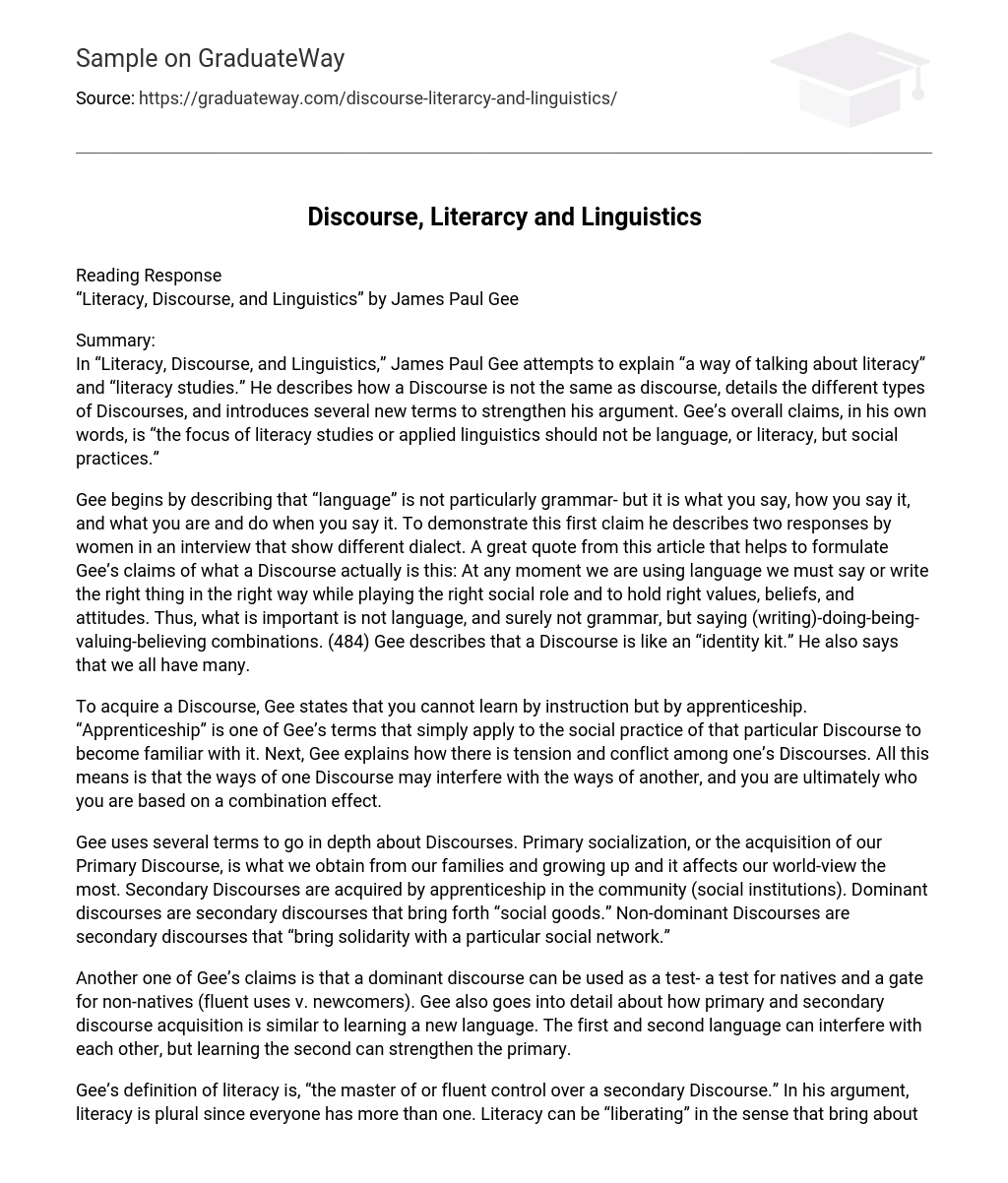Summary
In “Literacy, Discourse, and Linguistics,” James Paul Gee attempts to explain “a way of talking about literacy” and “literacy studies.” He describes how a Discourse is not the same as discourse, details the different types of Discourses, and introduces several new terms to strengthen his argument. Gee’s overall claims, in his own words, is “the focus of literacy studies or applied linguistics should not be language, or literacy, but social practices.”
Gee begins by describing that “language” is not particularly grammar- but it is what you say, how you say it, and what you are and do when you say it. To demonstrate this first claim he describes two responses by women in an interview that show different dialect. A great quote from this article that helps to formulate Gee’s claims of what a Discourse actually is this: At any moment we are using language we must say or write the right thing in the right way while playing the right social role and to hold right values, beliefs, and attitudes. Thus, what is important is not language, and surely not grammar, but saying (writing)-doing-being-valuing-believing combinations. (484) Gee describes that a Discourse is like an “identity kit.” He also says that we all have many.
To acquire a Discourse, Gee states that you cannot learn by instruction but by apprenticeship. “Apprenticeship” is one of Gee’s terms that simply apply to the social practice of that particular Discourse to become familiar with it. Next, Gee explains how there is tension and conflict among one’s Discourses. All this means is that the ways of one Discourse may interfere with the ways of another, and you are ultimately who you are based on a combination effect.
Gee uses several terms to go in depth about Discourses. Primary socialization, or the acquisition of our Primary Discourse, is what we obtain from our families and growing up and it affects our world-view the most. Secondary Discourses are acquired by apprenticeship in the community (social institutions). Dominant discourses are secondary discourses that bring forth “social goods.” Non-dominant Discourses are secondary discourses that “bring solidarity with a particular social network.”
Another one of Gee’s claims is that a dominant discourse can be used as a test- a test for natives and a gate for non-natives (fluent uses v. newcomers). Gee also goes into detail about how primary and secondary discourse acquisition is similar to learning a new language. The first and second language can interfere with each other, but learning the second can strengthen the primary.
Gee’s definition of literacy is, “the master of or fluent control over a secondary Discourse.” In his argument, literacy is plural since everyone has more than one. Literacy can be “liberating” in the sense that bring about a meta-language that can be beneficial.
Furthermore, Gee presents two theorems to his argument. First, someone cannot engage in a Discourse in a less than fluent manner. Second, primary Discourses cannot be liberating literacies. Finally, Gee ties all of his terms together with an example of a story created by a 5-year-old. The story is written in lines and stanzas, demonstrates filtering and transferring, and shows practice of a Discourse. Detail is given about the child’s primary Discourse and how it is affected, and how it affects her literacies.
Synthesis
Gee’s article seemed to be more of a textbook read to me. It contained all new material with several definitions, examples, and implications. I believe my summary is lengthy due to the fact that Gee covered so much ground with his article. His work relates to the work of Swales because Swales defines discourse community, which is essentially a community of fluent members involved in a secondary Discourse. I feel that Gee and Swales collaboratively describe everything there is to know about defining the terms of discourse and Discourse. There is a separation between the two terms.
Also, in Gee’s terms- I feel the Factory Farm Industry, or atleast the people involved in it, are in a dominant secondary Discourse. It is dominant because the “goal” (as required be Swales) is to raise profits. All three articles from this section so far are connected. I feel you will either understand all of them or none of them- that’s just an opinion though.





